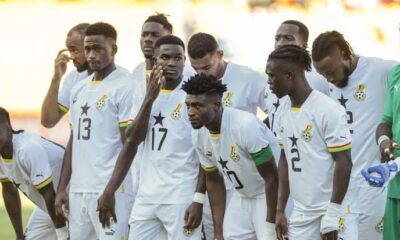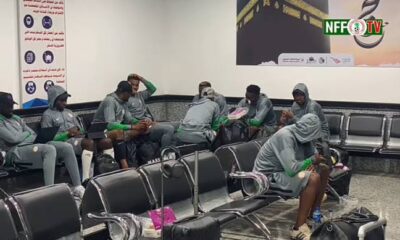Strictly Personal
Morocco Should Reconsider Alliance with Saudi Arabia and UAE
Last Wednesday, June 13, Moroccans were disheartened to see their country lose the race to host the 2026 FIFA World Cup. Millions of Moroccans were aware that the Morocco 2026 bid could not compare to the joint proposal of the US, Canada, and Mexico, known as United 2026, in terms of existing infrastructure
Published
6 years agoon
Last Wednesday, June 13, Moroccans were disheartened to see their country lose the race to host the 2026 FIFA World Cup. Millions of Moroccans were aware that the Morocco 2026 bid could not compare to the joint proposal of the US, Canada, and Mexico, known as United 2026, in terms of existing infrastructure. However, they were hopeful Morocco would create a surprise and win a majority of votes.
The Moroccan people pinned their hopes on the organization of the World Cup as an opportunity to boost Morocco’s economy, resulting in the creation of more than 100,000 jobs.
What Moroccans did not expect was that a country considered hitherto as a “brotherly” country and one of Morocco’s most strategic allies would betray them in the most brazen manner. Saudi Arabia left no stone unturned to prevent Morocco from organizing the World Cup. It not only announced support for the United 2026 bid, but intensified its efforts to persuade other countries to vote against Morocco.
What happened in Moscow and the power play that has been taking place in Saudi Arabia since Mohammed bin Salman became crown prince last June indicates that the relations between Morocco and Saudi and Arabia have taken a new turn.
The time has come for Morocco to officially and unequivocally announce its withdrawal from the Saudi-led coalition to oust the Houthi rebels in Yemen. At first, Morocco’s involvement stemmed from its belief that the war would be limited to air strikes lasting a short period of time.
Morocco’s participation was predicated on the premise that whatever harms the Saudis and Emiratis also harms Moroccans and vice-versa and that the strategic interests of the Saudis align with Morocco’s strategic interests.
However, Saudi Arabia and the United Arab Emirates were not only fighting the Houthi rebel group, but also devastating the country as a whole while committing war crimes against the Yemeni people. The two countries are playing a dangerous game in Yemen and in other countries; they have a subversive agenda and seek to destabilize all the countries that do not fall in line with it.
For example, after Morocco supported them in their war against the Houthis in Yemen, Saudi Arabia and the UAE expected Morocco to side with them in their brazen blockade of Qatar. But Morocco acted wisely and decided to remain neutral, offering to help the opposing parties overcome their crisis.
Morocco’s decision to remain neutral was intentional. It reflects a new direction in Morocco’s foreign policy towards making decisions independently of Saudi Arabia.
The votes of Saudi Arabia, the United Arab Emirates, and Bahrain against the Moroccan World Cup bid were clearly meant to punish Morocco’s decision to remain neutral in the Gulf crisis and act independently.
The new orientation of Saudi Arabia’s foreign policy under Mohammed bin Salman’s leadership is worrisome and risks plunging the whole Middle East and North Africa region into chaos and turmoil.
Morocco should by no means be associated with a country accused of committing war crimes in Yemen and of starving civilians there. Neither should Morocco be associated with the subversive agenda of the UAE and Saudi Arabia in the whole Arab world, be it in Qatar, Tunisia, Libya, Yemen, Lebanon, or Syria.
To achieve this goal, the first step that Morocco should take is to withdraw completely from any alliance led by Saudi Arabia and the United Arab Emirates. No more Moroccan men should die to defend these countries. No more decision should be made to please the Saudis or Emiratis.
Morocco should never follow these two countries’ foreign policy agenda, which is mainly inspired and manipulated by the Washington-based right-wing research center “Foundation for the Defense of Democracies” (FDD). This is the same think tank that helped orchestrate the Saudi-Emirati media campaign against Qatar since 2011.
The center recommends policies for Riyadh and Abu Dhabi to adopt in the Arab world. The think tank was also behind the frenetic media and political campaign to convince the American president and his entourage to withdraw from the 2015 Iran nuclear deal.
This center and its financiers have one main goal: to achieve regime change in Iran and prevent Iran from acquiring the atomic bomb. One of the biggest financiers of the center is Sheldon Adelson, who serves first and foremost the Israeli agenda. Adelson was a major donor to President Trump’s presidential campaign, and was behind his decision to relocate the US embassy from Tel Aviv to Jerusalem.
There are many reasons why Mohammed bin Salman considers Trump his first patron, which led him to betray Morocco. In addition to gaining U.S. support that helped Mohammed bin Salman seize power, Saudi Arabia’s goal is to convince the United States to overthrow the regime in Iran, which would be difficult and even impossible, given the strength of Iran.
The decision to take a confrontational stance against Iran was not made in Riyadh or Abu Dhabi, but in Washington, D.C. It was made and promoted by the FDD whose backers and experts make the reckless Saudi and Emirati leaders believe that the right path to challenge Iran’s subversive agenda in the region is to provoke regime change.
FDD’s ultimate goal is not to achieve the well-being and perennial stability of these two countries, but to eventually enable Israel to have the upper hand in the whole region. But the Saudis and the Emiratis take the bait.
In addition, Saudi Arabia lavishes billions on Trump and on many research centers, and lobbies to distract Americans from the JASTA Law enacted by the US Congress less than two years ago. The law gives the families of American victims of 9/11 the possibility to sue the Saudi government for its involvement in the terrorist attacks.
Moreover, Morocco, for which one of Jerusalem’s gates holds the name of its people “Moroccans’ Gate,” should not be linked to any policies aiming at abandoning the Palestinian people and betraying them in order to help the 32-year-old Saudi prince consolidate his power.
However, this does not mean that Morocco should enter into a tug-of-war with these countries. Rather, it must deal with them in a wise and pragmatic way, making foreign policy decisions that serve its strategic interests and that preserve its dignity and the dignity of its people.
Morocco’s bilateral relations with these countries should be built on mutual respect and mutual interest, rather than on empty slogans, blackmail, and provocations.
Commentator…Culled from Morocco World News
You may like
-


Morocco’s Mpox test gets African CDC endorsement
-


Ghanaians in tears as Black Stars fail to make AFCON 2025y
-


Moroccan star actress Sahar Seddiki blasts Royal Air Maroc for poor services
-


Morocco’s retail-tech startup Chari partners with Orange to digitise retailers
-


Reports say Libyan authorities have begun mass arrest of Nigerians following CAF verdict
-


Brazil’s Embraer to invest in Morocco’s aerospace sector
Strictly Personal
Budgets, budgeting and budget financing, By Sheriffdeen A. Tella, Ph.D.
Published
2 days agoon
November 20, 2024
The budget season is here again. It is an institutional and desirable annual ritual. Revenue collection and spending at the federal, State and local government levels must be authorised and guided by law. That is what budget is all about. A document containing the estimates of projected revenues from identified sources and the proposed expenditure for different sectors in the appropriate level of government. The last two weeks have seen the delivery of budget drafts to various Houses of Assembly and the promise that the federal government would present its draft budget to the National Assembly.
Do people still look forward to the budget presentation and the contents therein? I am not sure. Citizens have realised that these days, governments often spend money without reference to the approved budget. A governor can just wake up and direct that a police station be built in a location. With no allocation in the budget, the station will be completed in three months. The President can direct from his bathroom that 72 trailers of maize be distributed to the 36 states as palliatives. No budget provision, and no discussion by relevant committee or group.
We still operate with the military mentality. We operated too long under the military and of the five Presidents we have in this democracy, two of them were retired military Heads of State. Between them, they spent 16 years of 25 years of democratic governance. Hopefully, we are done with them physically but not mentally. Most present governors grew up largely under military regimes with the command system. That is why some see themselves as emperor and act accordingly. Their direct staff and commissioners are “Yes” men and women. There is need for disorientation.
The importance of budget in the art of governance cannot be overemphasized. It is one of the major functions of the legislature because without the consideration and authorisation of spending of funds by this arm of government, the executive has no power to start spending money. There is what we refer to as a budget cycle or stages. The budget drafting stage within the purview of the executive arm is the first stage and, followed by the authorisation stage where the legislature discusses, evaluates and tinkers with the draft for approval before presenting it to the President for his signature.
Thereafter, the budget enters the execution phase or cycle where programmes and projects are executed by the executive arm with the legislature carrying out oversight functions. Finally, we enter the auditing phase when the federal and State Auditors verify and report on the execution of the budgets. The report would normally be submitted to the Legislature. Many Auditor Generals have fallen victim at this stage for daring to query the executives on some aspects of the execution in their reports.
A new budget should contain the objectives and achievements of the preceding budget in the introduction as the foundation for the budget. More appropriately, a current budget derives its strength from a medium-term framework which also derives its strength from a national Development Plan or a State Plan. An approved National Plan does not exist currently, although the Plan launched by the Muhammadu Buhari administration is in the cooler. President Tinubu, who is acclaimed to be the architect of the Lagos State long-term Plan seems curiously, disillusioned with a national Plan.
Some States like Oyo and Kaduna, have long-term Plans that serve as the source of their annual budgets. Economists and policymakers see development plans as instruments of salvation for developing countries. Mike Obadan, the former Director General of the moribund Nigeria Centre for Economic and Management Administration, opined that a Plan in a developing country serves as an instrument to eradicate poverty, achieve high rates of economic growth and promote economic and social development.
The Nigerian development plans were on course until the adoption of the World Bank/IMF-inspired Structural Adjustment Programme in 1986 when the country and others that adopted the programme were forced to abandon such plan for short-term stabilisation policies in the name of a rolling plan. We have been rolling in the mud since that time. One is not surprised that the Tinubu administration is not looking at the Buhari Development Plan since the government is World Bank/IMF compliant. It was in the news last week that our President is an American asset and by extension, Nigeria’s policies must be defined by America which controls the Bretton Woods institutions.
A national Plan allows the citizens to monitor quantitatively, the projects and programmes being executed or to be executed by the government through the budgeting procedure. It is part of the definitive measures of transparency and accountability which most Nigerian governments do not cherish. So, you cannot pin your government down to anything.
Budgets these days hardly contain budget performance in terms of revenue, expenditure and other achievements like several schools, hospitals, small-scale enterprises, etc, that the government got involved in successfully and partially. These are the foundation for a new budget like items brought forward in accounting documents. The new budget should state the new reforms or transformations that would be taking place. Reforms like shifting from dominance of recurrent expenditure to capital expenditure; moving from the provision of basic needs programmes to industrialisation, and from reliance on foreign loans to dependence on domestic fund mobilisation for executing the budget.
That brings us to the issue of budget deficit and borrowing. When an economy is in recession, expansionary fiscal policy is recommended. That is, the government will need to spend more than it receives to pump prime the economy. If this is taken, Nigeria has always had a deficit budget, implying that we are always in economic recession. The fact is that even when we had a surplus in our balance of payment that made it possible to pay off our debts, we still had a deficit budget. We are so used to borrowing at the national level that stopping it will look like the collapse of the Nigerian state. The States have also followed the trend. Ordinarily, since States are largely dependent on the federal government for funds, they should promote balanced budget.
The States are like a schoolboy who depends on his parents for school fees and feeding allowance but goes about borrowing from classmates. Definitely, it is the parents that will surely pay the debt. The debt forgiveness mentality plays a major role in the process. Having enjoyed debt forgiveness in the past, the federal government is always in the credit market and does not caution the State governments in participating in the market. Our Presidents don’t feel ashamed when they are begging for debt forgiveness in international forum where issues on global development are being discussed. Not less than twice I have watched the countenance of some Presidents, even from Africa, while they looked at our president with disdain when issues of debt forgiveness for African countries was raised.
In most cases, the government, both at the federal and state cannot show the product of loans, except those lent by institutions like the World Bank or African Development Bank for specific projects which are monitored by the lending institutions. In other cases, the loans are stolen and transferred abroad while we are paying the loans. In some other cases, the loans are diverted to projects other than what the proposal stated. There was a case of loans obtained based on establishing an international car park in the border of the State but diverted to finance the election of a politician in the State. The politician eventually lost the election but the citizens of the State have to be taxed to pay the loan. Somebody as “Nigeria we hail thee”.
Transformation in budgeting should commence subsequently at the State and federal level. Now that local government will enjoy some financial autonomy and therefore budgeting process, they should be legally barred from contracting foreign loans. They have no business participating in the market. They should promote balanced budget where proposed expenditures must equal the expected revenues from federal and internal sources. The State government that cannot mobilise, from records, up to 40 percent of its total budget from IGR should not be supported to contract foreign loans. The States should engage in a balanced budget. The federal government budget should shift away from huge allocations to recurrent expenditure towards capital expenditure for capital formation and within the context of a welfarist state.
Sheriffdeen A. Tella, Ph.D.
Strictly Personal
African Union must ensure Sudan civilians are protected, By Joyce Banda
Published
4 weeks agoon
October 25, 2024
The war in Sudan presents the world – and Africa – with a test. This far, we have scored miserably. The international community has failed the people of Sudan. Collectively, we have chosen to systematically ignore and sacrifice the Sudanese people’s suffering in preference of our interests.
For 18 months, the Rapid Support Forces (RSF) and the Sudanese Armed Forces (SAF) have fought a pitiless conflict that has killed thousands, displaced millions, and triggered the world’s largest hunger crisis.
Crimes against humanity and war crimes have been committed by both parties to the conflict. Sexual and gender-based violence are at epidemic levels. The RSF has perpetrated a wave of ethnically motivated violence in Darfur. Starvation has been used as a weapon of war: The SAF has carried out airstrikes that deliberately target civilians and civilian infrastructure.
The plight of children is of deep concern to me. They have been killed, maimed, and forced to serve as soldiers. More than 14 million have been displaced, the world’s largest displacement of children. Millions more haven’t gone to school since the fighting broke out. Girls are at the highest risk of child marriage and gender-based violence. We are looking at a child protection crisis of frightful proportions.
In many of my international engagements, the women of Sudan have raised their concerns about the world’s non-commitment to bring about peace in Sudan.
I write with a simple message. We cannot delay any longer. The suffering cannot be allowed to continue or to become a secondary concern to the frustrating search for a political solution between the belligerents. The international community must come together and adopt urgent measures to protect Sudanese civilians.
Last month, the UN’s Independent International Fact-Finding Mission for Sudan released a report that described a horrific range of crimes committed by the RSF and SAF. The report makes for chilling reading. The UN investigators concluded that the gravity of its findings required a concerted plan to safeguard the lives of Sudanese people in the line of fire.
“Given the failure of the warring parties to spare civilians, an independent and impartial force with a mandate to safeguard civilians must be deployed without delay,” said Mohamed Chande Othman, chair of the Fact-Finding Mission and former Chief Justice of Tanzania.
We must respond to this call with urgency.
A special responsibility resides with the African Union, in particular the AU Commission, which received a request on June 21 from the AU Peace and Security Council (PSC) “to investigate and make recommendations to the PSC on practical measures to be undertaken for the protection of civilians.”
So far, we have heard nothing.
The time is now for the AU to act boldly and swiftly, even in the absence of a ceasefire, to advance robust civilian protection measures.
A physical protective presence, even one with a limited mandate, must be proposed, in line with the recommendation of the UN Fact-Finding Mission. The AU should press the parties to the conflict, particularly the Sudanese government, to invite the protective mission to enter Sudan to do its work free from interference.
The AU can recommend that the protection mission adopt targeted strategies operations, demarcated safe zones, and humanitarian corridors – to protect civilians and ensure safe, unhindered, and adequate access to humanitarian aid.
The protection mission mandate can include data gathering, monitoring, and early warning systems. It can play a role in ending the telecom blackout that has been a troubling feature of the war. The mission can support community-led efforts for self-protection, working closely with Sudan’s inspiring mutual-aid network of Emergency Response Rooms. It can engage and support localised peace efforts, contributing to community-level ceasefire and peacebuilding work.
I do not pretend that establishing a protection mission in Sudan will be easy. But the scale of Sudan’s crisis, the intransigence of the warring parties, and the clear and consistent demands from Sudanese civilians and civil society demand that we take action.
Many will be dismissive. It is true that numerous bureaucratic, institutional, and political obstacles stand in our way. But we must not be deterred.
Will we stand by as Sudan suffers mass atrocities, disease, famine, rape, mass displacement, and societal disintegration? Will we watch as the crisis in Africa’s third largest country spills outside of its borders and sets back the entire region?
Africa and the world have been given a test. I pray that we pass it.
Dr Joyce Banda is a former president of the Republic of Malawi.
EDITOR’S PICK


Ghana partners with The Gambia to provide free roaming services
Ghana and The Gambia are in the process of launching free roaming services that will enhance a West African connectivity....


Zambia: APP leader lampoons PF over pledge to reverse forfeited properties
Leader of one of Zambia’s opposition parties, Advocates for People’s Prosperity (APP), Mwenye Musenge, has criticised the Patriotic Front (PF)...


Ghanaian winger Fatawu out for season with ACL injury
Ghana and Leicester City winger, Abdul Fatawu, has been ruled out of the rest of the EPL season after suffering...


DRC authorities arrest six over break-in at Lumumba’s Mausoleum
Police in the Democratic Republic of Congo (DRC) say six people have been arrested over a break-in and vandalism at...


Finnish court imprisons Nigeria’s Simon Ekpa for aiding terrorism
Simon Ekpa, a Nigerian separatist leader based abroad, has been placed under detention by the Päijät Häme District Court...


Nigerian Senate confirms influx of terrorists from Mali, Burkina Faso into the country
The Nigerian Senate has raised the alarm over the influx of terrorists from Mali and Burkina Faso who operate in...


Tanzania to host 6th Ocean Innovation Africa summit in February
Dar es Salaam, Tanzania, has been selected to host the sixth edition of the Ocean Innovation Africa (OIA) summit from...


Miss SA opens up on why she withdrew from Miss Universe pageant
Reigning Miss South Africa 2024, Mia le Roux, has opened up on the reasons behind her withdrawal from the Miss...


SA football legend Lucas ‘Masterpieces’ Moripe passes away
South African football legend, Lucas “Masterpieces” Moripe, has passed away at the age of 71 after a long battle with...


Wanted Zambian MP who escaped from prison custody captured in Harare
A fugitive Zambian Member of Parliament (MP), Emmanuel Banda, who escaped from custody at the Chipata Prison in Eastern Province...
Trending
-

 Metro1 day ago
Metro1 day agoWanted Zambian MP who escaped from prison custody captured in Harare
-

 Sports1 day ago
Sports1 day agoSA football legend Lucas ‘Masterpieces’ Moripe passes away
-

 Culture1 day ago
Culture1 day agoMiss SA opens up on why she withdrew from Miss Universe pageant
-

 Politics1 day ago
Politics1 day agoUgandan opposition politician abducted, wife says


